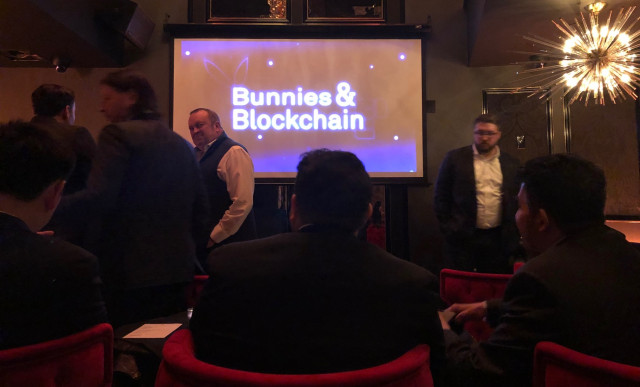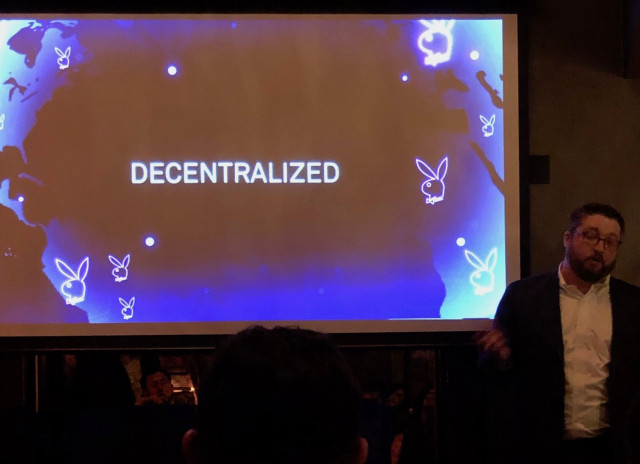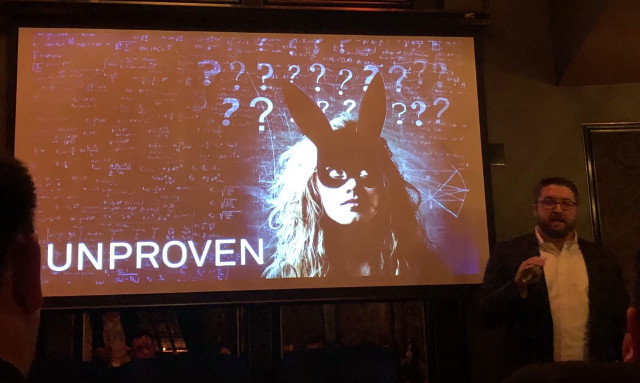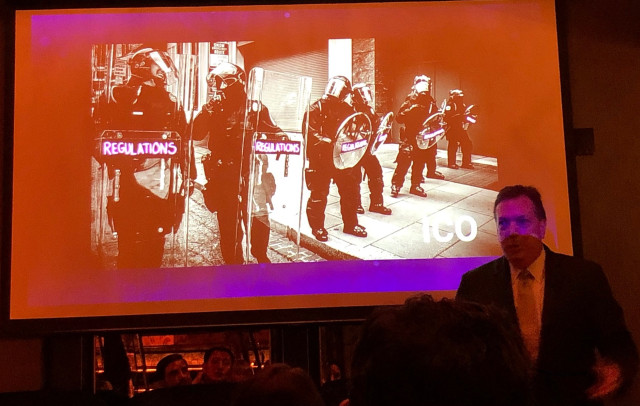Last night I found myself sitting on a blood red chair in a windowless basement, surrounded by men in suits. All of us were staring ahead at a projected slide featuring two words I’d never seen paired before: “Bunnies & Blockchain.”
About a year after Hugh Hefner’s death, the Playboy Club has re-emerged on New York’s West side (it opened its doors in fall 2018). Not only that, but it’s getting ready to host a monthly blockchain event. This is curious for two reasons. First, it’s frankly surprising that the club still exists, given its history of misogyny and the plethora of allegations against Hefner. It’s also surprising because the crypto bubble burst over a year ago.
Now is not a sexy time to get into blockchain, but somehow there seems to be plenty of interest among Playboy Club attendees. Perhaps it’s about as relevant to them in today’s world as Playboy itself—a vestige of richer, more exciting, sexier times (for white men).
When my colleague—another young woman—and I first enter the club, two men at the coat check assume we are there to set up for the event rather than attend it. This is a forgivable offense, as we happen to be wearing very similar looking outfits and clearly don’t fit with the collection of older, suit-wearing men who eventually show up for the Playboy Club’s inaugural blockchain event.
The upstairs of the Playboy Club is exactly what you’d imagine—circular bar, leather booths, and Playboy logos everywhere. Of course, there are also women walking around in low cut on the top, high cut at the bottom “bunny” outfits. The fluffy tails are bigger than I’d envisioned.
Men with varying amounts of hair begin taking seats around us at the bar.
Eventually we are escorted in groups of two to three downstairs to hear a basic presentation on blockchain technology and ask questions to a panel of “experts.” As we descend one, then two, then three flights of darkened stairwells, I assume I can only describe the room we wind up in as the club’s dungeon. Wrong. It’s called the Rabbit Hole, and the humor of learning about crypto down the literal rabbit hole is not lost on us.
Crammed into the Hole’s lower story, below a balcony that holds another dozen or so guests waiting to learn about blockchain, we strike up a conversation with a tall, red-haired woman in Bunny attire.
Two words I'd never seen paired before.

Sarah Gullixson is from the Bay Area, so she’s familiar with tech. She modestly relays that she knows six coding languages (which to her doesn’t seem to feel like a lot), and her ultimate plan is to start work on an app that she can pass along to a hardcore coder, who could really get it off the ground. There are “a lot of great applications” for blockchain, she thinks, but we haven’t quite gotten there yet.
“Thank you for taking time out of your NCAA viewing,” says Ryan Powers, of blockchain business services startup Punch Token, our presenter for this evening. He asks people to cheer if they own some cryptocurrency. There are a few light cheers and a couple of strong ones. Then Powers asks us to groan if we’re familiar with bitcoin and blockchain. There are some groans. Lastly, he asks for golf claps from those totally unfamiliar with both concepts. A few people clap quietly.
These bunny logos are not centralized.

Already, I’m learning. As the relatively new Playboys Club’s very first blockchain session, Powers sticks to the basis—but what I’m learning is not about blockchain. Rather, I’m coming to understand how a Playboy Club event feeds the idea of blockchain to its target demographic. According to my fellow attendees, that demographic appears to be middle-aged to older suit-wearing men who probably miss the ‘80s.
“The reason we’re all here,” continues Powers, “is what on earth is blockchain?… We know it was all the rage in 2017.” He sounds a bit like an uncool high school teacher trying to relate to his students, only he’s kind of doing the opposite. He’s talking to those who missed out on a craze, telling them, Hey, look, it’s not too late, you can still get in on this. He does it, in a way, smartly, embracing the “blockchain not bitcoin” ethos of today’s “buidl”-focused industry—just before introducing bitcoin as the “the granddaddy of them all.” This strikes me as the way one might relate Hefner to modern strip club moguls (if such things exist).
The slides manage to remind us where we are, which is at the Playboy Club.

Powers then introduces Ethereum and, surprisingly, IOTA—until we learn that Volkswagen is currently working on a “big project” with IOTA on self-driving cars. Powers is still speaking the language the people in this room are most apt to understand.
Minutes pass that feel longer than minutes. We hear words like immutable, decentralized, and transparency, even Venezuela. Somehow, slides of these words manage to remind us where we are, which is at the Playboy Club. For example, Playboy bunny logos float around the word “decentralized” on the projector. “You basically become the bank,” Powers says, alluding to how blockchain technology removes the middle man. Then comes the second most memorable line of the night, “Blockchain is literally a chain of blocks.”
Powers introduces a lawyer.
Kendall Americo, who specializes in crowdfunding, stands in front of the room to talk regulation. “Wow, I went to the Playboy Club and a lawyer started talking to me,” he says, as if that would be an odd occurrence. He tells a self-deprecating lawyer joke (“What’s black and brown and looks great on a lawyer?”), says ICOs are created by guys in basements to steal your money, and adds that STOs (security token offerings) are not only “the hottest thing on Wall Street,” but also “the hottest thing at the SEC.”
Many ICOs are created by guys in basements to steal your money, the lawyer says.

Now comes the most memorable line of the night. Before you invest in something, whether it’s a regular old investment or an STO, “do your research,” Americo insists, and make sure you know what you’re dealing with. “If it has a bunny tail and bunny ears, it’s a bunny.”
Hearty chuckles erupt from a few corners of the room. (Is he talking about investments, ICOs, I wonder? Our servers dressed in bunny ears? Actual, furry rabbits? Sometimes the complexity of blockchain confounds me.)
When the panel begins, featuring Americo alongside Elizabeth White, CEO of The White Company, a luxury goods exchange for those buying with crypto, and her colleague, Ranjeet Nabha, I have to go to the bathroom. In the women’s restroom, the wall behind the mirrors is filled with old Playboy covers, and the room is hellishly cold. I wonder whether women who enter here abandon all hope feel any remnants of the nostalgia these old covers are meant to evoke.
White, whom my colleague and I speak with after the presentation in a quiet corner of the club’s restaurant area, actually has a current connection to Playboy. Her sister, a founding member of a startup bent on ratifying the U.S. constitution to make it more female-inclusive, was featured in the magazine—“as a feminist,” she says.
Get the BREAKERMAG newsletter, a weekly roundup of blockchain business and culture.
“I think my future with the Playboy company is using my merchant processor, because we have hundreds of thousands of clients that probably want to be members, and why wouldn’t they pay with cryptocurrency?” asks White. Right now, on The White Company’s marketplace (which also offers use of a stablecoin to buyers, called the White Standard), customers can spend $200,000 worth of crypto on a silver Aston Martin or $4,000 on two tickets to Burning Man.
“When you hear Playboy, you think of Hugh Hefner with the lounge jacket and the cigars in the grotto and three, beautiful blondes,” says White, “but I think that moving forward, this is the new Playboy. It’s welcoming for women, and it’s welcoming for men.” She pauses. “Membership clubs are maybe coming back, as they’ve been looked at as something from the past. I think it’s kind of cool to bring [old] things back to current day.”
On the flipside, the majority of The White Company’s customers skew young. “I have a 16-year-old client who wanted a Nissan GT-R,” says White, but he didn’t have a bank account because all of his money was in crypto. Her company caters to a very niche sector of the, er, “unbanked”—“children who don’t have bank accounts but who maybe have earned as much wealth as their parents.”
The Playboy Club lets White reach a different demographic than her usual customer base. Her company plans to hold monthly blockchain events at the club. “It takes time to reach different generations,” says White. The kids already know about crypto, she suggests. It’s the older men at the Playboy Club who now want to learn about it.

After taking an obligatory selfie by the giant, floating Playboy logo in a nearby fish tank, we leave. An hour later, I realize I’ve left my sweater down the Rabbit Hole. I return and descend into the depths, only to find that a group of the younger attendees, whom I barely noticed before, have stuck around to discuss crypto. It’s the next generation. They’re here, at the Playboy Club, too.